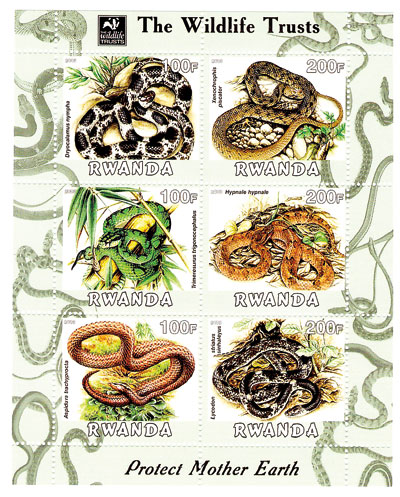News
Lankan snakes appear in bogus Rwanda stamp issue

Souvenir sheet purportedly issued by Rwanda, depicting snakes (including Dryocalamus nympha, Trimeresurus trigonocephalus, and Aspidura trachyprocta, in the left column and Xenochrophis piscator, Hypnale hypnale and Lycodon striatus in the right column) from Sri Lanka. All species are non-indigenous to Africa.
Sri Lankan snakes and the Republic of Rwanda have got coiled as victims in an illegal philatelic issue linked to stamp piracy.
Going as far back as April 1, 2003, it has come to light that an unknown agency, probably based in Eastern Europe, has produced a series of two labels, purportedly to be philatelic in nature in the name of the Republic of Rwanda, exclusively depicting snake species found in Sri Lanka, it has been revealed.
This has been highlighted in a ‘note’ titled ‘Illegal philatelic issues in the name of the Republic of Rwanda, depicting Sri Lankan images’ published in the International Society for the History and Bibliography of Herpetology, ISHBH Bibliotheca Herpetologica, Vol. 12: 50-53, 2016.
The three authors of the note are Indraneil Das of the Institute of Biodiversity and Environment Conservation, Universiti Malaysia, Sarawak, Malaysia and Anslem de Silva of Gampola & Jayantha Jinasena of Nawala, Sri Lanka.
Prof. Das, a collector of stamps, had spotted the use of these images.
The note states that the images have been used without permission from the water-colours executed by Mr. Jinasena, while with the exception of one, all other images had been published in a folio volume by Dr. de Silva.
The note explains that the contents of the series of two labels include a miniature sheet and a souvenir sheet. The miniature sheet — with ‘The Wildlife Trusts’ and a matching logo of the European badger Meles meles bordered by a xanthic Boa constrictor — depicts the Sri Lankan Green Pit Viper (Trimeresurus trigonocephalus) and has a face value of 500 Rwandan Francs.
The souvenir sheet, meanwhile, comprises six labels and features six species of snakes, according to the note. The three stamps in the left column, with face values of 100 Rwandan Francs, portray Dryocalamus nympha, Trimeresurus trigonocephalus and Aspidura trachyprocta. The three stamps in the right column with a face value of 200 Rwandan Francs feature Xenochrophis piscator, Hypnale hypnale and Lycodon striatus.
It also exhibits partial images of snakes in a collage both on the right and left margins which are the work of artist Mr. Jinasena and printed in the work of Dr. de Silva.
Dr. de Silva pointed out to the Sunday Times that the images of D. nympha, X. piscator and H. hypnale have been printed inverted and that of A. trachyprocta upside down.
The souvenir sheet also has the words ‘The Wildlife Trusts’ along with the logo and at the bottom the words ‘Protect Mother Earth’.
“Not aware of any Wildlife Trust branded stamps (and) if any did exist, they would have been produced in the UK,” is how The Wildlife Trusts, an independent 47-member charity covering the United Kingdom and the Isle of Man and Alderney and Britain’s largest non-governmental organisation involved in ecological restoration of land and sea, had responded when contacted on e-mail by the authors of the note.
Distancing itself from the products and possible copyright infringements, the Postal Agency of Rwanda has also categorically denied the issuance of these stamps, claiming that “unidentified, unscrupulous individuals are seeking to discredit our country by circulating postage stamps that they claim have been issued by Rwanda…….As the only body authorised to issue and disseminate postage stamps under Rwandan law, the National Post Office deplores this usurpation of its rights and condemns these shameful actions which undermine the reputation and tarnish the image of Rwandan philatelic products”.
It has also apprised the Universal Postal Union (UPU), an agency within the United Nations that coordinates postal policies among member nations and the World Association for the Development of Philately, of the piracy being perpetrated against Rwanda Post through the issue and sale of such illegal postage stamps.
The authors state: “Illegal issues of such labels by commercial enterprises or those printed for propaganda, are a major threat to postal revenue, can undermine the dignity of a nation’s people, cause political instability and damage the investment value of philately. It is arguably akin to bank-note counterfeiting (stamps being readily convertible to currency), and possibly also, money laundering, and has been classified as organised crime.”
They add that on January 1, 2002, the World Numbering System (WNS) was established by the World Association for the Development of Philately and the UPU listing all postage stamps issued by member countries.
The labels with the pirated Sri Lankan images are on sale online (including at eBay and Delcampe) at about US$1 for the miniature sheet and between US$1–4 for the souvenir sheet. A dealer had even been found selling ‘postally-used’ versions of the stamps from the souvenir sheet for US$4.10, with a ‘Rwanda’ cancellation.
Dr. de Silva explained that postmarks/cancellations on stamps typically bear names of post offices of transit, rather than country names, as in these pirated stamped.

